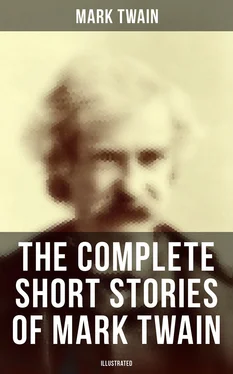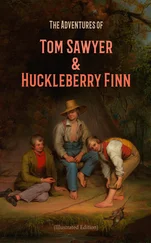“It ain’t no use. We can’t buck agin him. He just utilizes everything we put up to modify him with, and gives it his own flavor and plays it back on us. Why, Cap., don’t you know, it’s as much as a hundred times worse in there now than it was when he first got a-going. I never did see one of ’em warm up to his work so, and take such a dumnation interest in it. No, Sir, I never did, as long as I’ve ben on the road; and I’ve carried a many a one of ’em, as I was telling you.”
We went in again after we were frozen pretty stiff; but my, we couldn’t stay in, now. So we just waltzed back and forth, freezing, and thawing, and stifling, by turns. In about an hour we stopped at another station; and as we left it Thompson came in with a bag, and said—
“Cap., I’m a-going to chance him once more – just this once; and if we don’t fetch him this time, the thing for us to do, is to just throw up the sponge and withdraw from the canvas. That’s the way I put it up.”
He had brought a lot of chicken feathers, and dried apples, and leaf tobacco, and rags, and old shoes, and sulphur, and asafœtida, and one thing or another; and he, piled them on a breadth of sheet iron in the middle of the floor, and set fire to them.
When they got well started, I couldn’t see, myself, how even the corpse could stand it. All that went before was just simply poetry to that smell – but mind you, the original smell stood up out of it just as sublime as ever – fact is, these other smells just seemed to give it a better hold; and my, how rich it was! I didn’t make these reflections there – there wasn’t time – made them on the platform. And breaking for the platform, Thompson got suffocated and fell; and before I got him dragged out, which I did by the collar, I was mighty near gone myself. When we revived, Thompson said dejectedly—
“We got to stay out here, Cap. We got to do it. They ain’t no other way. The Governor wants to travel alone, and he’s fixed so he can outvote us.”
And presently he added,
“And don’t you know, we’re pisoned. It’s our last trip, you can make up your mind to it. Typhoid fever is what’s going to come of this. I feel it a-coming right now. Yes, sir, we’re elected, just as sure as you’re born.”
We were taken from the platform an hour later, frozen and insensible, at the next station, and I went straight off into a virulent fever, and never knew anything again for three weeks. I found out, then, that I had spent that awful night with a harmless box of rifles and a lot of innocent cheese; but the news was too late to save me; imagination had done its work, and my health was permanently shattered; neither Bermuda nor any other land can ever bring it back to me. This is my last trip; I am on my way home to die.
Table of Contents
This is not a fancy sketch. I got it from a clergyman who was an instructor at Woolwich forty years ago, and who vouched for its truth.—M.T.
It was at a banquet in London in honor of one of the two or three conspicuously illustrious English military names of this generation. For reasons which will presently appear, I will withhold his real name and titles, and call him Lieutenant-General Lord Arthur Scoresby, V.C., K.C.B., etc., etc., etc. What a fascination there is in a renowned name! There sat the man, in actual flesh, whom I had heard of so many thousands of times since that day, thirty years before, when his name shot suddenly to the zenith from a Crimean battlefield, to remain forever celebrated. It was food and drink to me to look, and look, and look at that demi-god; scanning, searching, noting: the quietness, the reserve, the noble gravity of his countenance; the simple honesty that expressed itself all over him; the sweet unconsciousness of his greatness—unconsciousness of the hundreds of admiring eyes fastened upon him, unconsciousness of the deep, loving, sincere worship welling out of the breasts of those people and flowing toward him.
The clergyman at my left was an old acquaintance of mine—clergyman now, but had spent the first half of his life in the camp and field, and as an instructor in the military school at Woolwich. Just at the moment I have been talking about a veiled and singular light glimmered in his eyes, and he leaned down and muttered confidentially to me—indicating the hero of the banquet with a gesture:
"Privately—he's an absolute fool."
This verdict was a great surprise to me. If its subject had been Napoleon, or Socrates, or Solomon, my astonishment could not have been greater. Two things I was well aware of: that the Reverend was a man of strict veracity, and that his judgment of men was good. Therefore I knew, beyond doubt or question, that the world was mistaken about this hero: he was a fool. So I meant to find out, at a convenient moment, how the Reverend, all solitary and alone, had discovered the secret.
Some days later the opportunity came, and this is what the Reverend told me:
About forty years ago I was an instructor in the military academy at Woolwich. I was present in one of the sections when young Scoresby underwent his preliminary examination. I was touched to the quick with pity, for the rest of the class answered up brightly and handsomely, while he—why, dear me, he didn't know anything , so to speak. He was evidently good, and sweet, and lovable, and guileless; and so it was exceedingly painful to see him stand there, as serene as a graven image, and deliver himself of answers which were veritably miraculous for stupidity and ignorance. All the compassion in me was aroused in his behalf. I said to myself, when he comes to be examined again, he will be flung over, of course; so it will be simply a harmless act of charity to ease his fall as much as I can. I took him aside, and found that he knew a little of Cæsar's history; and as he didn't know anything else, I went to work and drilled him like a galley-slave on a certain line of stock questions concerning Cæsar which I knew would be used. If you'll believe me, he went through with flying colors on examination day! He went through on that purely superficial "cram," and got compliments too, while others, who knew a thousand times more than he, got plucked. By some strangely lucky accident—an accident not likely to happen twice in a century—he was asked no question outside of the narrow limits of his drill.
It was stupefying. Well, all through his course I stood by him, with something of the sentiment which a mother feels for a crippled child; and he always saved himself—just by miracle, apparently.
Now of course the thing that would expose him and kill him at last was mathematics. I resolved to make his death as easy as I could; so I drilled him and crammed him, and crammed him and drilled him, just on the line of questions which the examiners would be most likely to use, and then launched him on his fate. Well, sir, try to conceive of the result: to my consternation, he took the first prize! And with it he got a perfect ovation in the way of compliments.
Sleep? There was no more sleep for me for a week. My conscience tortured me day and night. What I had done I had done purely through charity, and only to ease the poor youth's fall. I never had dreamed of any such preposterous result as the thing that had happened. I felt as guilty and miserable as Frankenstein. Here was a wooden-head whom I had put in the way of glittering promotions and prodigious responsibilities, and but one thing could happen: he and his responsibilities would all go to ruin together at the first opportunity.
The Crimean War had just broken out. Of course there had to be a war, I said to myself. We couldn't have peace and give this donkey a chance to die before he is found out. I waited for the earthquake. It came. And it made me reel when it did come. He was actually gazetted to a captaincy in a marching regiment! Better men grow old and gray in the service before they climb to a sublimity like that. And who could ever have foreseen that they would go and put such a load of responsibility on such green and inadequate shoulders? I could just barely have stood it if they had made him a cornet; but a captain—think of it! I thought my hair would turn white.
Читать дальше












